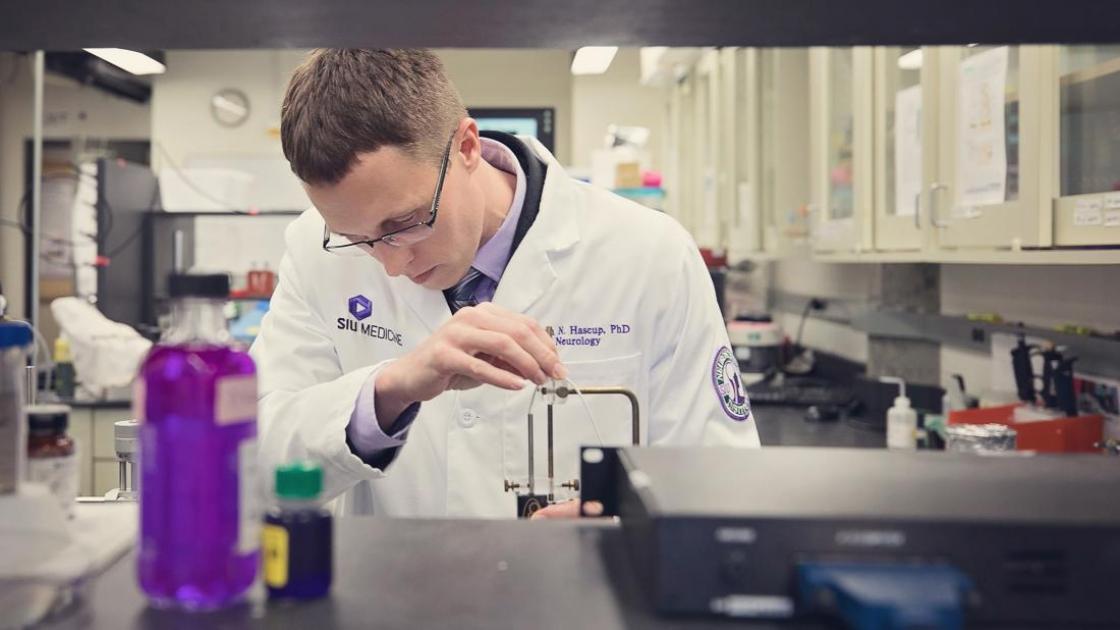
Introducing the Dale and Deborah Smith Center
A major gift to SIU School of Medicine will transform the health care of people throughout Illinois and beyond. Springfield couple Dale and Deborah Smith donated a substantial financial gift to the Center for Alzheimer’s Disease and Related Disorders at SIU Medicine to expand research, enhance programming and improve care for people with Alzheimer’s disease and assist their caregivers. The center will now be named the Dale and Deborah Smith Center for Alzheimer’s Research and Treatment at SIU Medicine.
The center provides clinical care, research and community programs throughout Illinois. Since 1986, its employees have diagnosed, treated and educated Illinoisans with Alzheimer’s and other forms of dementia and their families. In the past year, the center, along with its Memory and Aging Network, has served more than 4,000 patients and their families. The National Institute on Aging of the National Institutes of Health has awarded more than $7.2 million in grants to the center for Alzheimer’s-related research in the past three years. Learn more at siumed.edu/neuro/alz.
“This gift from Dale and Deborah Smith will continue to propel research at SIU that may translate into novel treatments and interventions for patients in the future,” says Jerry Kruse, MD, MSPH, dean and provost at SIU School of Medicine. “It will also provide much needed clinical, educational and community support for those with Alzheimer’s and their families.”
Despite decades of pharmaceutical development and drug testing, Alzheimer’s disease continues to be incurable, and prevention may hold the greatest hope for combating this disease. The research team at the Center for Alzheimer’s Research and Treatment is focused on discovering ways to slow its progression.
Erin R. Hascup, PhD, serves as the center’s director and associate professor in the Departments of Neurology and Pharmacology at SIU School of Medicine.
“What we want to do is understand the changes that are occurring across disease progression, including in the very early stages,” she says. “Many have Alzheimer’s for up to 30 years prior to cognitive decline, so we want to intervene earlier to slow or stop disease progression and improve patient outcomes and quality of life.”
In addition to a better quality of life, early and accurate diagnosis and timely intervention could save up to $7.9 trillion in medical and health care costs, according to the Alzheimer’s Association.
The center is focusing on creative ways to improve the quality of life for both patients and caregivers through a variety of programs that use art therapy, music therapy and movement for individuals with dementia.
Springfield-area caregiver Janet Scott and her husband are two of the more than 4,800 patients and caregivers who have participated in a ‘Beyond the Medical Center’ program in the last two years. “I cannot imagine what my life would be like had we not come here,” she says. “SIU has meant everything to me. They’ve been like my third arm, I’ve depended on them for so much.”
Currently, 5.7 million Americans are living with Alzheimer’s. By 2050, this number is projected to rise to nearly 14 million. Illinois communities will continue to be impacted by various forms of dementia as the population ages, and the Smiths are eager to be a part of the solution locally and beyond.
“As longtime Springfield residents, we’re proud of the impact the School of Medicine has had on the community,” Dale Smith says. “The efforts of the Alzheimer’s center inspired us to give and hopefully create a consciousness within the community around the breadth of research and patient care we have here. Alzheimer’s is a terrible disease, and we hope our gift can help researchers at SIU Medicine produce better clinical outcomes that improve our community, one family at a time.”
Scientists in the Hascup laboratory recently published data showing that diabetes alters the signals crossing between neurons in the hippocampus (where learning and memory functions are housed in the brain), called glutamate neurotransmission.
Their team is pursuing a variety of other research projects at SIU Medicine, including:
- Use of medication targeted at receptors to restore glutamate function and cognitive decline associated with Alzheimer’s disease.
- Determining the neurochemical changes that occur as a result of post-traumatic stress disorder (PTSD) in military veterans that makes them more susceptible to Alzheimer’s disease.
- Tracking Alzheimer’s disease progression within glutamate neurotransmission by using a memory test to determine changes over a lifespan.
- Identifying early biomarkers and therapeutic targets for Alzheimer’s disease. As the project progresses and targets are identified, pharmaceuticals will be administered to try to alter Alzheimer’s disease outcomes and delay or stop cognitive decline.
- Determining the relationship between cellular senescence (when cells stop functioning properly, common in aging and in Alzheimer’s), inflammation, glutamatergic neurotransmission (important for learning and memory) and cognition.
- Gaining a better understanding of the long-term effects of COVID-19 on Alzheimer’s patients. Individuals with mild cognitive impairment and Alzheimer’s disease often have a “leaky” blood-brain barrier that may give COVID-19 easier access, causing inflammation and additional damage.
- Examining the prevalence, treatment and outcomes in rural-urban settings, along with racial disparities in relation to Alzheimer’s and related disorders to better understand the disease’s demographics and improve patient outcomes.
Gifts received by the SIU Foundation support the growth of the School of Medicine, including its medical research efforts. Those interested in donating can do so at forwardfunder.siumed.edu/CARE or by contacting the SIU School of Medicine Foundation Office at foundation@siumed.edu or 217-545-2955.



